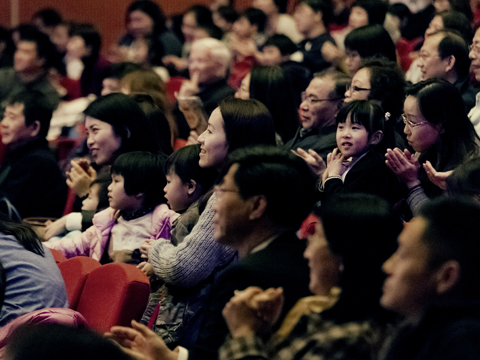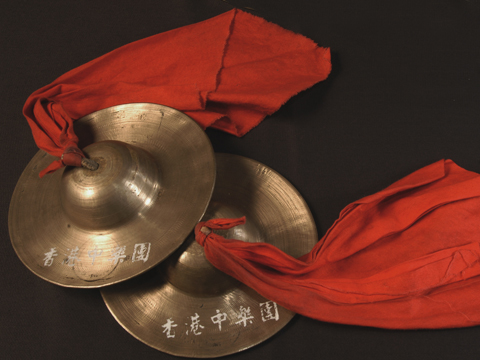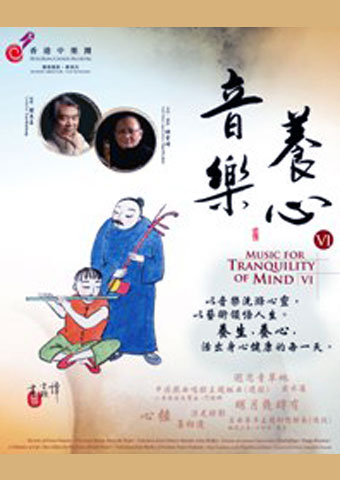
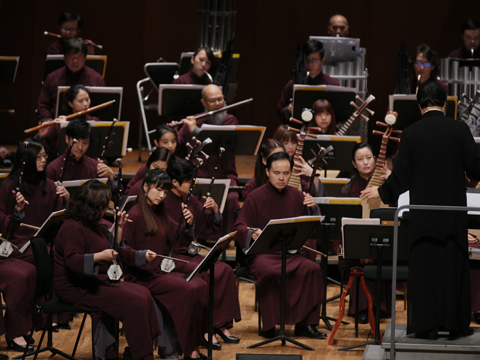
HKCO
Hong Kong Chinese Orchestra Artistic Director and Principal Conductor for Life Orchestra Members Council Advisors & Artistic Advisors Council Members Management Team Vacancy Contact Us (Tel: 3185 1600)

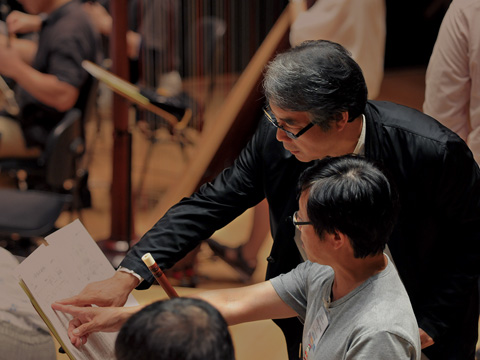
What's On

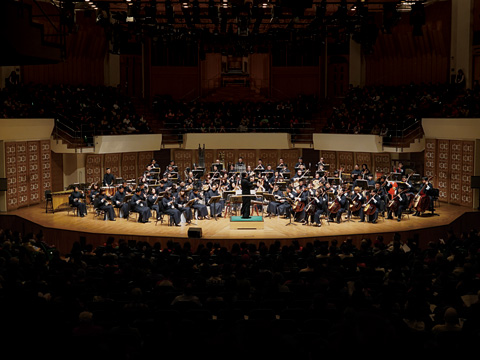
Concerts

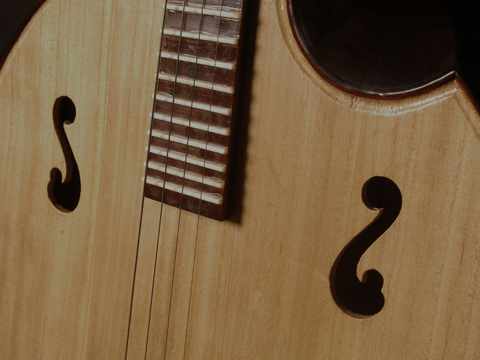
Education
The HKCO Orchestral Academy Hong Kong Youth Zheng Ensemble Hong Kong Young Chinese Orchestra Music Courses Chinese Music Conducting 賽馬會中國音樂教育及推廣計劃 Chinese Music Talent Training Scheme HKJC Chinese Music 360 The International Drum Graded Exam

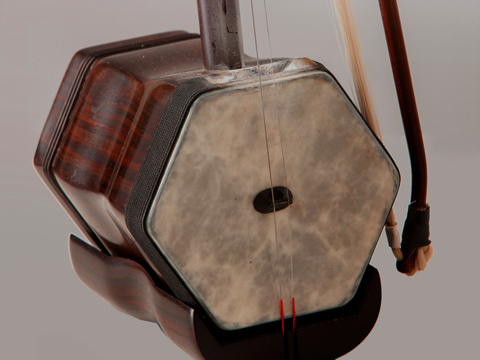
Instrument R&D
Eco-Huqins Chinese Instruments Standard Orchestra Instrument Range Chart and Page Format of the Full Score Configuration of the Orchestra
35th Orchestral Season
View Event Calendar
Full List Calendar
Music for Tranquility of Mind VI
Date and Time
8-10/6/2012
8:00pm (8-9/6)
3:00pm (10/6)
8:00pm (8-9/6)
3:00pm (10/6)
Venue
Hong Kong Cultural Centre Studio Theatre
Ticket Fee
$250, $180
Conductor
Yan Huichang
Performed by
Tam Po-shek
Let music cleanse your heart and soul and virtually massage your pressure points
Enjoy a soul spa through guided appreciation of music for finding tranquility and peace of mind
A sell-out every season – book your tickets early!
Enjoy a soul spa through guided appreciation of music for finding tranquility and peace of mind
A sell-out every season – book your tickets early!
Video
Programme
Reverie of Green Pastures Joshua Chan
Zheng, dongxiao, yehu, gehu and string ensemble
The Lotus Rising Above the Water Arr. by Qu Chunquan
Zheng: Luo Jing Dongxiao: Choo Boon-chong
Yehu: Hui Yin Erhu: Tung Hiu-lo
Tutti Selections from Chinese Operatic Arias Medley
Zheng, dongxiao, yehu, gehu and string ensemble
The Lotus Rising Above the Water Arr. by Qu Chunquan
Zheng: Luo Jing Dongxiao: Choo Boon-chong
Yehu: Hui Yin Erhu: Tung Hiu-lo
Tutti Selections from Chinese Operatic Arias Medley
Kwan Sing-yau
Erhuang and variation, Cricket Fights
Monochord Zither Solo Heartstrings Yang Yidan
Monochord Zither: Han Jingna
Dizi Quartet and Orchestra Happy Reunion Folk Music of Shanxi
Arr. By Zhou Chenglong based on the solo arrangement by Feng Zicun and Fang Kun
A Glimmer of Life June Bremner Arr. by Lo Leung-fai
Erhu and Orchestra How Often Do We Have a Bright Moon?
Chen Ning-chi
Erhu: Zhang Chongxue
Tutti Selections from Medley of Famous Tunes Fantasia
Arr. by Wu Wai-lap
Three Variations on the Plum Blossom Melody, Torrents of the River, Song of the General
Erhuang and variation, Cricket Fights
Monochord Zither Solo Heartstrings Yang Yidan
Monochord Zither: Han Jingna
Dizi Quartet and Orchestra Happy Reunion Folk Music of Shanxi
Arr. By Zhou Chenglong based on the solo arrangement by Feng Zicun and Fang Kun
A Glimmer of Life June Bremner Arr. by Lo Leung-fai
Erhu and Orchestra How Often Do We Have a Bright Moon?
Chen Ning-chi
Erhu: Zhang Chongxue
Tutti Selections from Medley of Famous Tunes Fantasia
Arr. by Wu Wai-lap
Three Variations on the Plum Blossom Melody, Torrents of the River, Song of the General
Music: Views and Previews
Music good for the heart is also good for the Body
Chow Fan-fuTo be healthy, one needs to stay physically fit; and in this day and age, there are so many possible routes to physical fitness. However, whether all these methods are effective remains to be seen. In reality, most urbanites are living under a lot of pressure every day, particularly the stress of dealing with material pursuits. As a result, the urbanite heart often founders, leading to the ever increasing incidence of cardiovascular disorders. Therefore, the prerequisite to good physical health is, first and foremost, a good strong heart, and music is the best prescription for its health.
In his 1871 publication The Descent of Man, the celebrated English naturalist Charles Darwin remarked on the ubiquitous existence of music among “men of all races”, and “was incessantly struck” by the mental similarities he observed between the distinctly different races. The innate and omnipresent appreciation of music was an enigma, as if it were a miraculous mystery gift bestowed on humankind by the Almighty. This special musical endowment is being constantly enhanced and refined through modern technology. It has become progressively evident that this divine gift is the ideal antidote to the inevitable emotional upheavals that are part of human life. It is the cure for the full range of human sentiments, and can provide spiritual relief and mental quietude.
Much of the tension in today’s metropolitan existence comes from the desire and the quest for material possessions. The best safeguard against such mental strain is actually vigorous spiritual well-being. Research in modern pathology has found that the human body is like a delicate and sophisticated precision instrument. Biologically, the body is designed to take only a specific load. Exceeding the limit may lead to psychological imbalance and mental disorders. In the more severe cases, even physiological functions may be affected. At this stage, psychiatric intervention is needed to logically and scientifically rebuild mental health. During the recovery process, apart from the traditional psychological counselling and medication regime, it is very important to incorporate a robust spiritual component. Humankind’s intrinsic capacity for music is often harnessed in psychotherapy.
Obviously, not all music is suited for psychotherapeutic purposes, or has a clear heart-strengthening and body-fortifying effect. Generally speaking, musical rhythm and melody affect humans in different ways: strong rhythmic music stimulates the heart, increases the heart rate, and brings on excitement and an upbeat mood; whereas soothing melodic music slows the heart rate down, relaxes and settles the listener, and evokes a sense of well-being. The human response to melody in music is particularly exceptional. This may be because melody expresses human feelings, much as language expresses human ideas, and feelings are often the best “lubricants” for the human soul. They are wonderful nutrients for a healthy heart and body. Music can also help with the practice of meditation, when one can calmly internalize the profound meaning of life, and thereby attain tranquility and peace of mind.
The programme for the HKCO’s forthcoming concert Music for Tranquility of Mind VI has included compositions specially selected from the rich experience and extensive repertoires of Tam Po-shek and Yan Huichang. The chosen pieces are all considered effective for strengthening the heart and the body. They can further be combined with literature, painting, calligraphy and fitness to form a kind of spiritual fortification that safeguards physical and spiritual fitness.
Your Support
The HKCO is a non-profit organization. It is through your support that we can continue to make life beautiful, with arts, music, and a thankful heart.
Friends of HKCO
Copyright © 2025 HKCO
